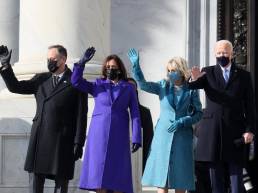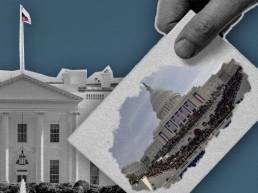The first step towards electing a President in the United States is the primaries of each party. Republicans and Democrats choose their candidates in the primaries, which are held in each of the states.
When a President seeks re-election, he rarely has an opponent, as is the case with Donald Trump this year, but the vote takes place anyway, in parallel with that of the Democratic Party. Since this year there is an internal race for the nomination among the Democrats, let’s focus on the process of this party.
How do primaries work?
The system for the election of the President is very different from what we have in Portugal. Every four years, there is a set calendar for the primary elections to take place in each of the states, with different dates, during the year of the presidential election. Iowa is typically the first state to vote for the candidate of each party and New Hampshire the second. This year, Nevada and South Carolina were next. After these, there are polls that can be grouped together, as is the case with Super Tuesday, the day when the largest number of States go to the polls. This year, there were 14 states, including California and Texas.
There are two types of voting to elect the presidential candidate of each party: by secret vote (mostly), which are the primaries themselves; or by the so-called caucuses(as it happens in Iowa and part of Nevada).
Who can vote in the primaries and caucuses?
Voters who can vote in the primaries depend on the state and the party concerned.
In the two models, primaries and caucuses, there are open elections (where registered voters and supporters can vote), closed elections (where only registered voters from each party can vote) and a hybrid model, with some variations:
- States like New York and Pennsylvania only allow registered voters in each party to vote in their respective primaries.
- States like North Carolina allow parties to determine whether voters who are not registered in any party can or cannot participate in the primaries.
- States like Ohio and Illinois allow voters from other parties to vote in the primary, but those who vote must make their preference public.
- States like Arizona and New Hampshire allow all non-affiliates to vote in the primary. The vote must be made public, but voters are not obliged to join a party.
- States like Alabama or Texas allow all voters to vote in any party’s primary, regardless of whether they are enrolled in a different party.
The models depend not only on the state where the vote will take place but also on the party and the type of election. In presidential elections, the rules are different in at least 13 states.
Who do voters vote for in the primary?
When they go to the polls, voters choose the candidate they prefer to be the party’s nominee for the presidential election. However, the choice is not limited to the number of votes and the candidate.
The goal of the primaries is to elect delegates to vote for the presidential candidate at the party convention. Therefore, in practice, by voting on the behalf of the candidate the voter wishes to become President, voters are indeed choosing a number of delegates who will support the candidate when the party convention is held in the summer leading up to the November election. That is, a number of delegates are assigned to each of the candidates before the convention and must vote for that candidate to be nominated at the convention.
Who are these delegates?
Delegates are elected at local party conventions, which can be community leaders, responsible, in the States where they compete, for areas such as Education or others. Delegates represent citizens at national party conventions.
When the votes are cast in the polls, some of these delegates are not yet chosen, meaning a delegate may have been nominated to support Joe Biden at the convention, but be a Bernie Sanders supporter and be elected in that seat.
Can delegates vote for candidates other than those chosen in the primary?
It’s not supposed to happen very often, but it wouldn’t be unheard of. For example, in the 2012 election, some supporters of libertarian Rand Paul were elected in seats assigned to Mitt Romney, the Republican nominee. It was assumed that they would vote for Mitt Romney, but they ended up voting for Rand Paul, albeit in small numbers. What the rules dictate is that candidates should reflect “in good conscience” the vote of the primaries.
So you vote in the primary and whoever wins the State wins all the delegates, is that it?
Not exactly. In the primaries, each party has different rules. In the Republican Party, most of the primaries are in a winner takes all regime, that is, whoever gets first place gets all the delegates assigned. In the Democratic Party, the regime is different. A proportional system was adopted, in which the number of delegates is distributed by the candidates proportionally to the number of votes in each county.
And if a candidate quits, what happens to the delegates who, in the meantime, he won?
It depends on the states. In some cases, the candidates who have suspended their campaign may declare support for another candidate still in the race and, upon arrival at the convention, those delegates are required to vote for that candidate. In other cases, delegates are free to make their choice.
How many delegates does it take to win the primary?
Regardless of the number of votes, the nomination only takes place formally at the convention of each party. In the case of the Democrats, a candidate can be chosen in the first round if he has at least 1,991 delegates.
If no candidate can obtain the minimum number of votes, the convention is designated as a contested convention or ‘brokered convention‘. In other words, there is a phase of negotiations in the convention itself before the second round of votes.
In a possible second round, 771 more superdelegates come into play (party leaders and elected officials) who are not tied to any candidate by the primary vote. These superdelegates cannot vote before a second round but can express their support in the first round without their vote counting to decide the nomination.
Related Posts
25 de January, 2021
Observador Newsletter: What can a President do in it’s first hour in office? Interview with Jim Costa
The power and limitations of governing…
21 de January, 2021
‘América Vinte Vinte’: Biden’s inaugural adress and first decisions
This week, Nuno Severiano Teixeira,…
18 de January, 2021
Observador Newsletter: Why does the inauguration matter?
The importance of the new president's…



